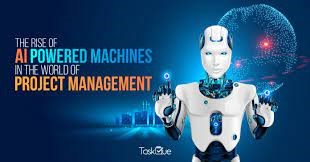Sometime in the near future, the CEO of a large telecom provider is using a smartphone app to check on her organization’s seven strategic initiatives.
Within a few taps, she knows the status of every project and what percentage of expected benefits each one has delivered. Project charters and key performance indicators are available in moments, as are each team member’s morale level and the overall buy-in of critical stakeholders.
She drills down on the “rebranding” initiative. A few months earlier, a large competitor had launched a new green brand, prompting her company to accelerate its own sustainability rollout. Many AI-driven self-adjustments have already occurred, based on parameters chosen by the project manager and the project team at the initiative’s outset. The app informs the CEO of every change that needs her attention — as well as potential risks — and prioritizes decisions that she must make, providing potential solutions to each.
Before making any choices, the CEO calls the project manager, who now spends most of his time coaching and supporting the team, maintaining regular conversations with key stakeholders, and cultivating a high-performing culture. A few weeks earlier the project had been slightly behind, and the app recommended that the team should apply agile techniques to speed up one project stream.
During the meeting, they simulate possible solutions and agree on a path forward. The project plan is automatically updated, and messages are sent informing affected team members and stakeholders of the changes and a projection of the expected results.
Thanks to new technologies and ways of working, a strategic project that could have drifted out of control — perhaps even to failure — is now again in line to be successful and deliver the expected results.
Back in the present, project management doesn’t always move along quite as smoothly, but this future is probably less than a decade away. To get there sooner, innovators and organizations should be investing in project management technology now.
Project Management Today and Path Forward
Every year, approximately $48 trillion are invested in projects. Yet according to the Standish Group, only 35% of projects are considered successful. The wasted resources and unrealized benefits of the other 65% are mind-blowing.
For years in our research and publications, we have been promoting the modernization of project management. One reason we have found why project success rates are so poor is the low level of maturity of technologies available for managing them. Most organizations and project leaders are still using spreadsheets, slides, and other applications that haven’t evolved much over the past few decades. These are adequate when you are measuring project success by deliverables and deadlines met, but they fall short in an environment where projects and initiatives are always adapting — and continuously changing the business. There has been improvement in project portfolio management applications, but planning and team collaboration capabilities, automation and “intelligent” features are still lacking.
If applying AI and other technological innovations to project management could improve the success ratio of projects by just 25%, it would equate to trillions of dollars of value and benefits to organizations, societies, and individuals. Each of the core the technologies described in the story above is ready — the only question now is how soon they will be effectively applied to project management.
Gartner’s research indicates that change is coming soon, predicting that by 2030, 80% of project management tasks will be run by AI, powered by big data, machine learning (ML), and natural language processing. A handful of researchers, such as Paul Boudreau in his book Applying Artificial Intelligence Tools to Project Management, and a growing number of startups, have already developed algorithms to apply AI and ML in the world of project management. When this next generation of tools is widely adopted, there will be radical changes.
6 Aspects of Project Management that Will Be Disrupted


